Revolutionizing Digital Learning Demystifying LMS
In the modern era of education, technology has changed the way we learn and teach. One of the most effective and widely used tools in education technology is the Learning Management System (LMS). An LMS is a software application that provides a platform for the creation, delivery, and management of educational content. In this article, we will explore what an LMS is, how it works, and its benefits.
What is an LMS?
A Learning Management System (LMS) is a software application that enables educators to create, deliver, and manage educational content. The LMS provides a platform for organizing and delivering content to students, tracking their progress, and assessing their performance. It is a comprehensive tool that streamlines the learning process for both students and educators.
How does an LMS work?
An LMS works by providing a platform for educators to create and deliver educational content, such as lectures, quizzes, and assignments. The content is organized into courses, which can be accessed by students through the LMS. The LMS tracks student progress and provides feedback to both students and educators. It also provides a platform for communication between students and educators.
Benefits of an LMS
With an LMS, both students and teachers can access a wealth of resources that make the learning process more dynamic, interactive, and engaging. Below, we discuss the benefits of an LMS and how it can transform the way we learn.
1. Flexibility
An LMS provides flexibility for both educators and students. Educators can create and deliver content from anywhere, and students can access the content from anywhere, at any time.
2. Customization
An LMS can be customized to meet the specific needs of educators and students. Educators can create courses that are tailored to the needs of their students, and students can customize their learning experience.
3. Tracking
An LMS tracks student progress and provides feedback to both students and educators. This allows educators to identify areas where students may need additional support and provide targeted feedback.
4. Collaboration
An LMS provides a platform for communication and collaboration between students and educators. Students can ask questions, collaborate on projects, and receive feedback from their peers and educators.
5. Accessibility
An LMS provides accessibility for students with disabilities. It can be customized to meet the needs of students with visual, auditory, and physical disabilities.
6. Cost-effective
An LMS can be cost-effective for educational institutions. It reduces the need for physical classrooms and materials, and it can be used to deliver content to a large number of students.
7. Time-saving
An LMS can save time for educators. It streamlines the process of creating and delivering content, and it automates administrative tasks such as grading and tracking student progress.
Types of LMS
There are several types of LMS that can be used. Below are the most common types:
1. Cloud-based LMS
A cloud-based LMS is hosted on a remote server and accessed through the internet. It allows educators and students to access content from any device with an internet connection.
2. Self-hosted LMS
A self-hosted LMS is installed on a local server and accessed through a local network. It provides greater control over the LMS, but requires more technical expertise to set up and maintain.
3. Open-source LMS
An open-source LMS is a free, community-driven platform that can be customized to meet the specific needs of educators and students. It provides greater flexibility and control over the LMS, but requires more technical expertise to set up and maintain.
Conclusion
An LMS is a powerful tool that provides a platform for the creation, delivery, and management of educational content. It provides flexibility, customization, tracking, collaboration, accessibility, cost-effectiveness, and time-saving benefits for both educators and students. There are different types of LMS, including cloud-based, self-hosted, and open-source LMS. As technology continues to evolve, the use of LMS in education is expected to grow, providing new opportunities for learning and teaching.
Are you ready to take your eLearning program to the next level? Look no further than David Ealy Technologies! Our expert team can provide LMS implementation support, ensuring a seamless transition to a comprehensive learning management system. Contact us today to learn more about how we can help your organization succeed in the digital age.
References
1. Johnson, L., Adams Becker, S., Estrada, V., & Freeman, A. (2015). NMC horizon report: 2015 higher education edition. The New Media Consortium.
2. Siemens, G., & Baker, R. S. (2012). Learning analytics and educational data mining: Towards communication and collaboration. Educational Researcher, 41(7), 14-23.






